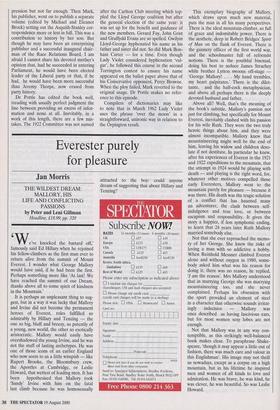Everester purely for pleasure
Jan Morris
THE WILDEST DREAM: MALLORY, HIS LIFE AND CONFLICTING PASSIONS by Peter and Leni Gillman Headline, £18.99, pp. 320 We've knocked the bastard off,' famously said Ed Hillary when he rejoined his fellow-climbers as the first man ever to return alive from the summit of Mount Everest. I wonder what George Mallory would have said, if he had been the first. Perhaps something more like 'At last! We have reached the summit of our Dream, thanks above all to some spirit of kindness in the Mountain.'
It is perhaps an unpleasant thing to sug- gest, but in a way it was lucky that Mallory and Irvine did not become the permanent heroes of Everest, roles fulfilled so admirably by Hillary and Tenzing — the one so big, bluff and breezy, so patently of a young, new world, the other so exotically aristocratic. Mallory would easily have overshadowed the young Irvine, and he was not the stuff of lasting archetypes. He was one of those icons of an earlier England who now seem to us a little wimpish — like Rupert Brooke, the Bloomsbury crew, the Apostles at Cambridge, or Leslie Howard, that wettest of leading men. It has been hypothesised that Mallory took `Sandy' Irvine with him on the fatal last climb because he was homosexually attracted to the boy: could anyone dream of suggesting that about Hillary and Tenzing? This exemplary biography of Mallory, which draws upon much new material, puts the man in all his many perspectives. There is the ideal mountain-climber, so full of grace and indomitable power. There is the aesthete, deep in Robert Bridges' Spirit of Man on the flank of Everest. There is the gunnery officer of the first world war, and the schoolmaster full of reformist notions. There is the youthful bisexual, doing his best to seduce James Strachey while brother Lytton swoons off-stage 'George Mallory! . . . My hand trembles, my heart palpitates.' There is the dilet- tante, and the half-cock metaphysician, and above all perhaps there is the deeply devoted husband and father.
Above all? Well, that's the meaning of the book's subtitle. Mallory's passion not just for climbing, but specifically for Mount Everest, inevitably clashed with his passion for his wife Ruth. They were the two truly heroic things about him, and they were almost incompatible. Mallory knew that mountaineering might well be the end of him, leaving his widow and children deso- late if not destitute. In particular he knew, after his experiences of Everest in the 1921 and 1922 expeditions to the mountain, that the attempt in 1924 would be playing with death — and playing is the right word, for, whatever other motives compelled those early Everesters, Mallory went to the mountain purely for pleasure — because it was there. His death was the tragic solution of a conflict that has haunted many an adventurer, the clash between self- indulgence and true love, or between escapism and responsibility. It gives the story a happier, if less symphonic ending, to learn that 24 years later Ruth Mallory married somebody else.
Not that she ever reproached the memo- ry of her George. She knew the risks of loving a man with so addictive a hobby. When Reinhold Messner climbed Everest alone and without oxygen in 1980, some- body asked him what was his reason for doing it; there was no reason, he replied, `I am the reason'. Mrs Mallory understood that in marrying George she was marrying mountaineering too, and she never complained. Perhaps his obsession with the sport provided an element of steel in a character that otherwise sounds irritat- ingly indecisive — Mallory was once described as having lascivious ears, but for most women sexy lobes are not enough.
Not that Mallory was in any way con- temptible, as this strikingly well-balanced book makes clear. To paraphrase Shake- speare, 'though it may appear a little out of fashion, there was much care and valour in this Englishman'. His image may not thrill us nowadays, except as a corpse on a high mountain, but in his lifetime he inspired men and women of all kinds to love and admiration. He was brave, he was kind, he was clever, he was beautiful. So was Leslie Howard.


























































 Previous page
Previous page